- A wealth of functions
- AI functionalities that increase the tool's power tenfold
- A powerful, intuitive Journey Builder
Our review of Salesforce Marketing Cloud
Salesforce Marketing Cloud is Salesforce's all-in-one marketing platform. It enables you to manage marketing campaigns across all channels and create ultra-personalized customer journeys (marketing automation). Undoubtedly one of the most comprehensive and powerful marketing software packages on the market.
My opinion
Customer reviews
- Very high rates
- A rather complex platform to use at first
- Expensive customer support
Ideal for (very) large, ambitious SMEs and major groups wishing to implement a sophisticated marketing strategy.
From 1,250$ per month
Free demo on request
Sommaire
Salesforce Marketing Cloud is the all-in-one, omnichannel marketing platform developed by Salesforce, the global CRM market leader. No doubt about it, this is one of the most sophisticated solutions on the market. Salesforce Marketing Cloud is organized around two functional pillars: campaign managers (Email Studio, Mobile Studio…) and the Journey Builder, designed to create personalized customer journeys (marketing automation).
Because of its price positioning, Salesforce Marketing Cloud is aimed more at large enterprises, even if Salesforce has thought of SMEs and developed a $25 per user per month offer that theoretically gives access to Marketing Cloud functionalities (which will not be discussed much in this article).
Marketing is available in two main versions: the B2C “Engagement” version, and the B2B “Account Engagement” version, which is none other than Pardot.
In this article, find out all you need to know about Salesforce Marketing Cloud and our detailed review of the platform.
Discover Salesforce Marketing Cloud
Access the official Salesforce Marketing Cloud demo and explore the key features of Salesforce’s all-in-one marketing platform.
Sommaire
My opinion of Salesforce Marketing Cloud in a nutshell
| Perimeter | Score | My opinion |
|---|---|---|
| Overall rating | 4,5 | Salesforce Marketing Cloud is one of the most comprehensive marketing platforms on the market. You can manage all marketing channels, from email to push, SMS, social networks, WhatsApp and even the Internet of Things… The functional scope and depth are remarkable. The two main disadvantages of Salesforce Marketing Cloud are its high price and its complexity. |
| Ease of use | 4 | The Salesforce Marketing Cloud interface is well designed, clean and modern, but the learning curve is steep. It takes a little time to get used to the platform and find your bearings. Training sessions are not a luxury. That’s the price you have to pay to benefit from such a rich platform. |
| Easy to install | 4,7 | Salesforce Marketing Cloud is a SaaS product, hosted by the publisher and accessible via any web browser. No hardware installation is required. To set up and customize the platform, you can rely on Salesforce’s support (via the Jump Start program) or call on the services of a Salesforce consultant or integrator. |
| Customer service | 4 | Salesforce provides access to free, comprehensive online resources for training on the platform (the Trailhead). The “human” customer support is of a very high standard, multi-channel and in French, but is not included in the package. You must subscribe to the Premier Success Plan, which costs 30% of the software license price. |
| Integrations | 4,7 | Salesforce offers hundreds of connectors on the AppExchange, as well as an API for connecting your other tools to Marketing Cloud. In fact, Salesforce Marketing Cloud is interoperable with most other tools and information systems. |
| Value for money | 4,3 | Salesforce is very expensive, and clearly not within the reach of every company. Does the platform’s quality justify its prices? Yes and no. If you have very complex requirements and make full use of the features on offer, yes, without a doubt. If not, Salesforce is probably not the platform for you. Discover 10 alternatives to Salesforce for demanding SMBs. |
The pros and cons of Salesforce Marketing Cloud at a glance
- Salesforce Marketing Cloud is an ultra-rich, ultra-powerful platform. In this, Salesforce is not stealing its reputation. The range of functions is impressive. From campaign management (email, SMS, push, WhatsApp, web…) to the creation of marketing automation scenarios, performance analysis, customer knowledge, product recommendation and web personalization, Marketing Cloud can theoretically do it all.
- The artificial intelligence features are very impressive. Salesforce’s AI (Einstein) can be used to generate campaign content, create engagement scores, optimize message timing, optimize marketing pressure management, make personalized recommendations…
- A powerful, intuitive Journey Builder that lets you set up ultra-personalized customer journeys based on your customers’ behavior and life phases (marketing automation).
- Salesforce Marketing Cloud is expensive. Thanks to its price positioning, the platform is aimed at large companies. To give you an idea, the basic offer, at $1,250 per month, simply gives access to the campaign manager (and not to the Journey Builder). That said, Salesforce has launched an offer for SMEs: Starter, at $25 per month. At this price, access to features is limited.
- Using Salesforce Marketing Cloud requires a considerable learning curve. It takes dozens of hours of exploration and training to get to grips with the platform. The reason is not a poor user experience, it’s simply that the platform is extremely rich. Functional richness often goes hand in hand with complexity, as is the case with Salesforce Marketing Cloud.
- Customer support is not included in the package. You have access to free online resources, but to benefit from “human” support, you need to add 30% to the price of the license.
Discover Salesforce Marketing Cloud
Access the official Salesforce Marketing Cloud demo and explore the key features of Salesforce’s all-in-one marketing platform.
Salesforce Marketing Cloud overview
Salesforce’s product offering is rather complex and difficult to understand for the uninitiated. To put Salesforce Marketing Cloud in the right context, it’s important to remember that Salesforce’s core product is Sales Cloud, a B2B CRM software package for managing lead interactions and the sales cycle. Salesforce has steadily expanded its offering, developing :
- Customer service management software: Service Cloud.
- Online sales management software: Ecommerce Cloud.
- Business intelligence software: Tableau (acquired by Salesforce for $15 billion in 2019)
- A collaboration tool: Slack (acquired by Salesforce in 2020 for a cool $27 billion).
- A Customer Data Platform: Data Cloud.
- An omnichannel marketing platform: Marketing Cloud.
The list is long, but it doesn’t sum up Salesforce’s offering, which includes other products that we don’t need to mention here. Salesforce isn’t a piece of software, it’s an ecosystem, a complete, integrated suite that meets a wide range of needs. The various products interconnect very well.
Marketing Cloud is Salesforce’s platform for managing relational and promotional marketing across all channels: email, sms, push notifications, social networks, website, display advertising, Internet of Things, and more. It’s an all-in-one, omnichannel marketing platform (campaign management, marketing automation and reporting).
But it would be too simple to stop there. Marketing Cloud consists of three distinct products:
- Marketing Cloud Engagement (formerly ExactTarget), the B2C marketing platform for orchestrating marketing campaigns and scenarios across the entire customer journey.
- Marketing Cloud Account Engagement (formerly Pardot), Salesforce’s B2B marketing platform, designed to manage lead generation and nurturing campaigns and scenarios.
- Marketing Cloud Personalization (formerly Interaction Studio), which is the most comprehensive and also the most expensive product, with advanced product recommendation and real-time web personalization features. Marketing Cloud Personalization lets you exploit the full potential of customer data and AI.
Something to keep in mind
When we talk about “Marketing Cloud” without further clarification, we’re usually talking about Marketing Cloud Engagement. When referring to the B2B version, many professionals continue to speak of “Pardot”.
Here is a summary diagram proposed by Salesforceben, an excellent blog dedicated to Salesforce :
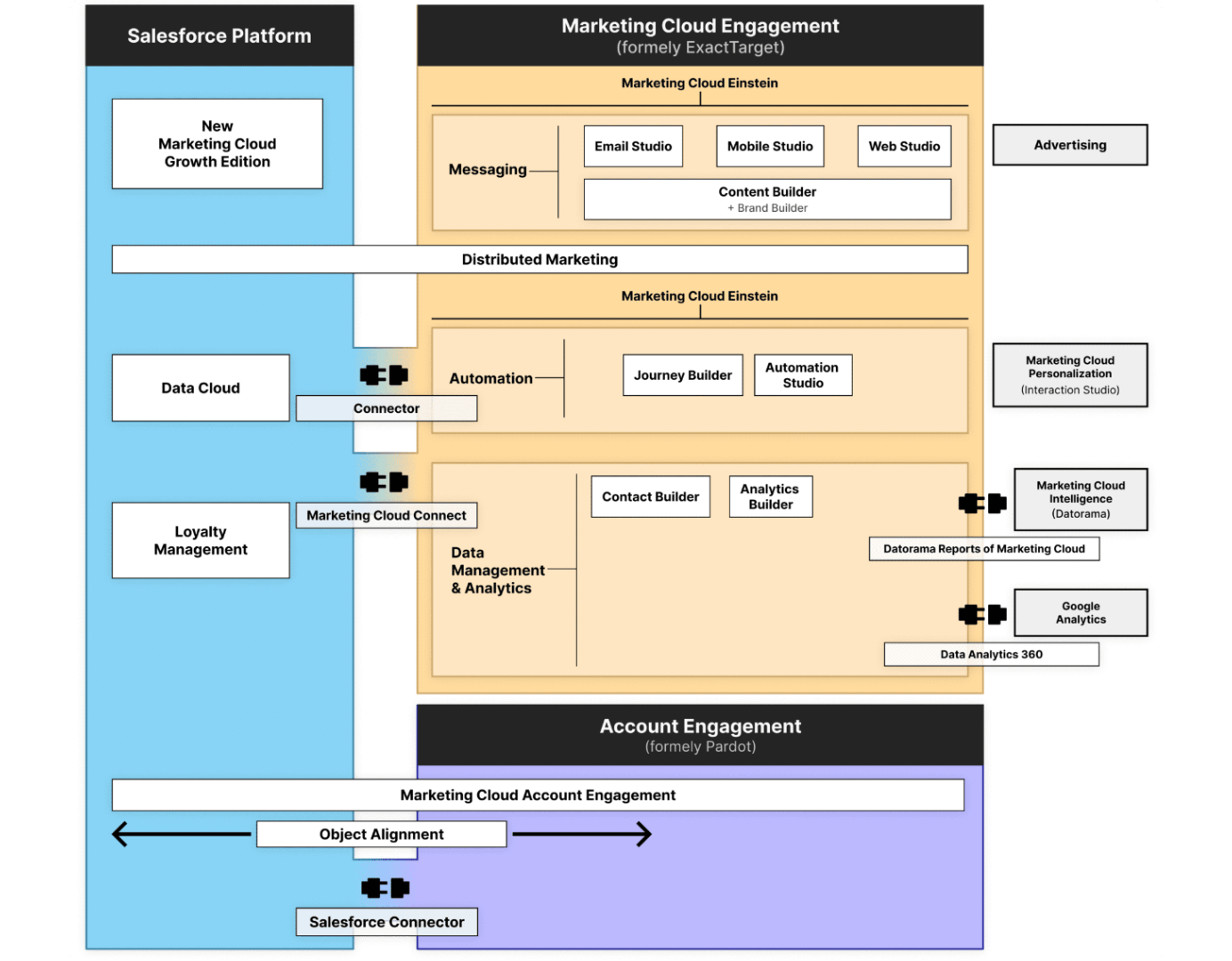
If you’re having trouble understanding the subtleties of this diagram, that’s normal. It’s not so much Salesforceben’s fault as Salesforce’s. Their offer is objectively difficult to decipher. A complex offer requires a complex layout. Here are the key facts to remember:
- Salesforce Marketing Cloud Engagement, the B2C marketing platform, comprises three main functional building blocks:
- A campaign manager that lets you edit your marketing campaigns across all digital channels: email, sms, push, web, etc.
- A Journey Builder, for creating marketing automation scenarios. For example: orchestrate a sequence of actions and messages to relaunch abandoned shopping baskets.
- A customer data management and analysis tool that lets you manage your contact lists and customer segments, and analyze the performance of marketing automation campaigns and scenarios.
- Salesforce Account Engagement, the platform for managing and automating B2B marketing: lead generation, lead nurturing, sales follow-up, etc., then fits into this scheme. The diagram shows that Marketing Cloud Engagement and Account Engagement are two fundamentally distinct products.

Salesforce Marketing Cloud Engagement can be plugged into other products in the Salesforce suite, including Data Cloud (Salesforce’s CDP) and Loyalty Management, which manages loyalty programs.
This article focuses on Salesforce Marketing Cloud Engagement. But it’s impossible not to mention Salesforce Account Engagement, which will certainly be of interest to Salesdorado readers.
Discover Salesforce Marketing Cloud
Access the official Salesforce Marketing Cloud demo and explore the key features of Salesforce’s all-in-one marketing platform.
Contact management in Salesforce Marketing Cloud
Salesforce Marketing Cloud offers advanced contact and list management features. Salesforce uses a “relational” data model: all your customer data (at least that integrated into the platform) is attached to contacts and organized in a set of linked tables that store contact information, attributes and events. That’s for the technical explanation. As a user, you have access to a list of all contacts that you can filter and query.
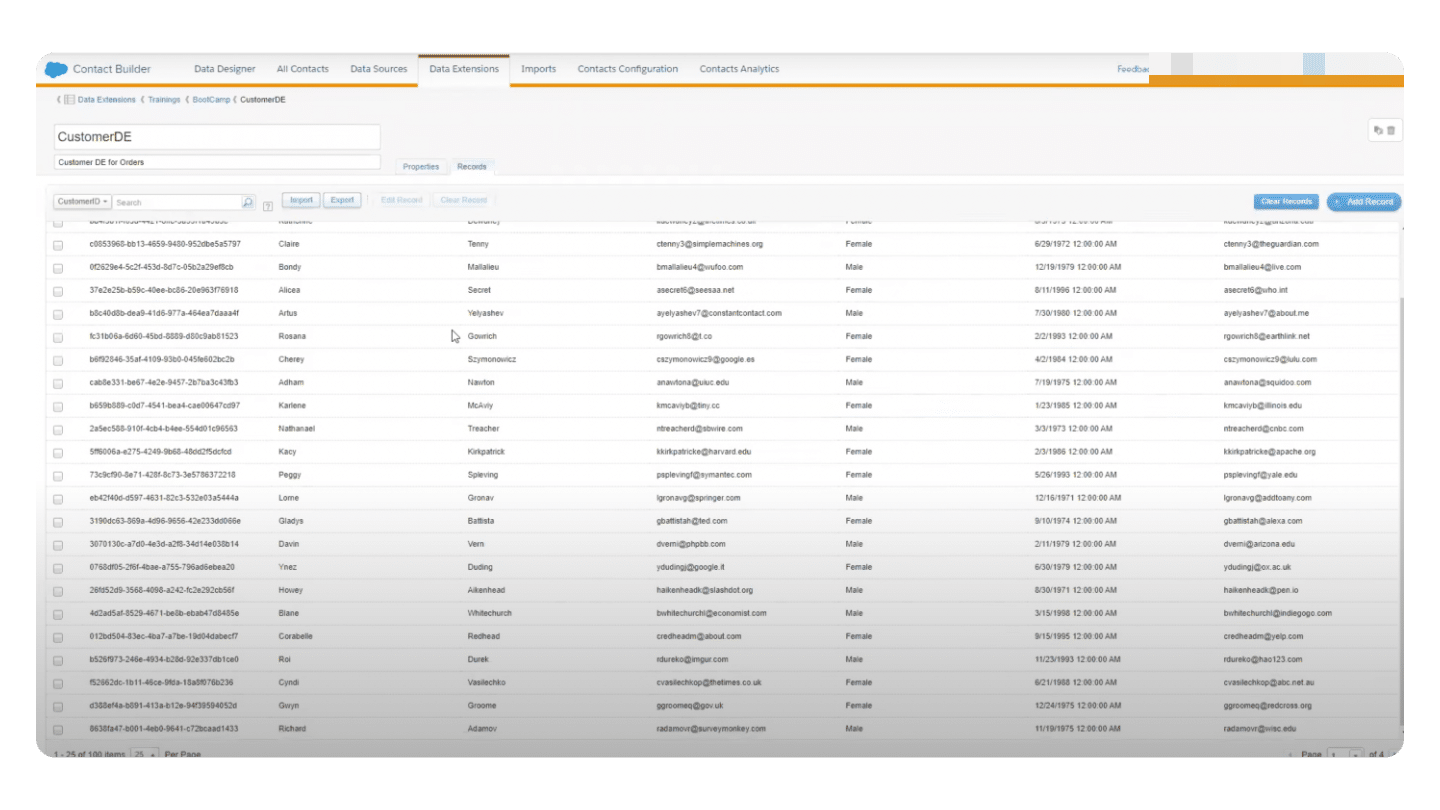
It’s from this master table that you can build your lists, segments and audiences to target marketing campaigns and scenarios. You can create groups of contacts based on socio-demographic, behavioral or transactional criteria. In addition to static contact lists, you can also create dynamic segments that are updated in real time according to customer behavior or life phases (for example, when a customer makes a certain purchase, he can automatically move from one segment to another).
Salesforce Marketing Cloud lets you import your contacts manually (by importing files) or dynamically (by creating data flows between your data sources and Marketing Cloud).
In Salesforce Marketing Cloud, managing contacts, lists and segments is both (relatively) simple and comprehensive.
Marketing campaign management (email, mobile…)
Salesforce Marketing Cloud lets you design, edit and plan your marketing campaigns. The basic Salesforce Marketing Cloud plan only gives access to the email campaign manager. To manage campaigns on other channels, such as SMS, push or WhatsApp, you need to subscribe to the superior plan (more details on rates at the end of this article).
Unsurprisingly, the Email Studio is of a very high standard. It provides access to a host of customizable email templates. Or, if you prefer, you can import your own email templates or edit them from scratch from Marketing Cloud. Salesforce Marketing Cloud offers a 100% no-code, visual editor based on drag & drop logic: you can add any element by simply dragging and dropping it from the options available in the left-hand menu.
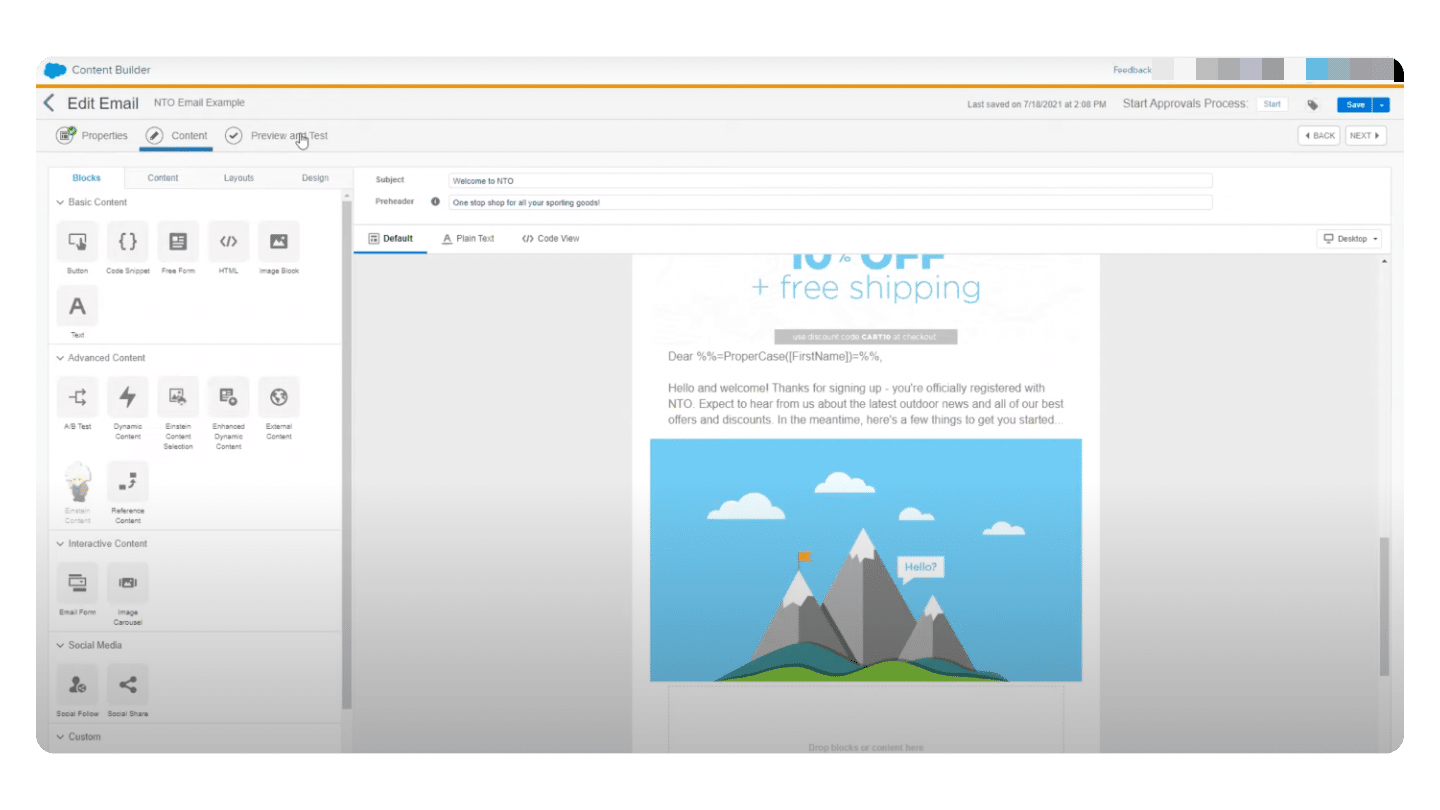
If you’ve already used a marketing campaign manager, you won’t be disappointed. You can add just about any personalization variable, starting with the classic First / Last Name.

Mobile Studio provides access to a visual editor based on the same logic as the email editor. It lets you edit the content of your SMS, WhatsApp and push campaigns. Dozens of customizable templates are also available.

All the advanced features associated with marketing campaign managers are available in Salesforce Marketing Cloud, such as A/B testing, dynamic personalization and detailed performance analysis. Salesforce has found the perfect balance between functional richness and ease of use.
Discover Salesforce Marketing Cloud
Access the official Salesforce Marketing Cloud demo and explore the key features of Salesforce’s all-in-one marketing platform.
Marketing automation management: the Journey Builder
Journey Builder, which is only available from the $4,400 per month “Advanced” plan upwards, is the heart of Salesforce Marketing Cloud. It allows you to create personalized customer paths (marketing automation scenarios) in a fairly intuitive way. Operation is fairly straightforward. You start by defining the point of entry into the scenario, for example a customer action (a cart abandonment) or a change in customer status. Next, you build the sequence of actions to be triggered on the contacts entered in the scenario. Journey Builder is 100% visual and therefore quite intuitive, as the screenshot below shows:
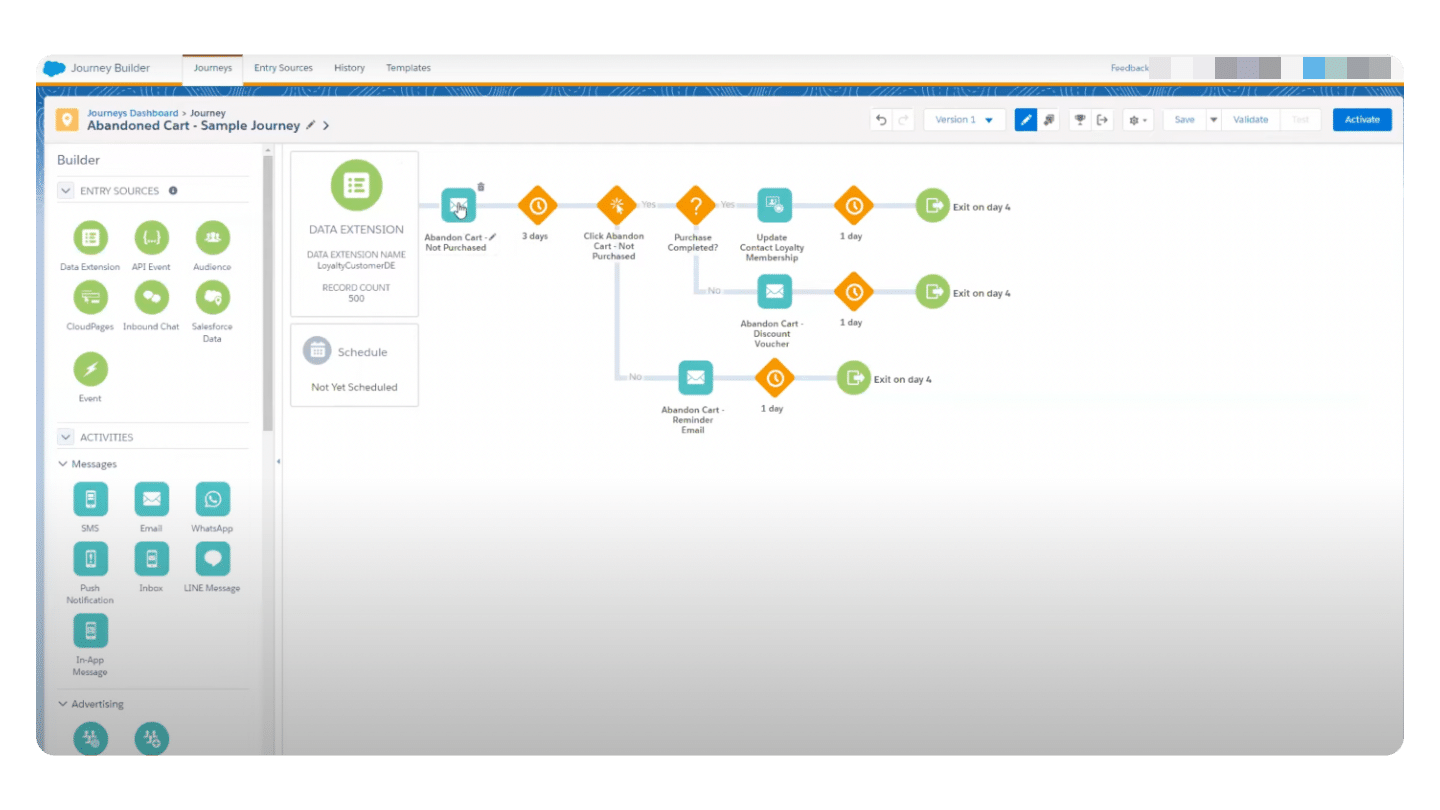
It is of course possible to create cross-channel scenarios, including email, SMS, push and even in-app messages. You can also run A/B tests to continuously improve the performance of your customer journeys.
Something to keep in mind
Compared with Email Studio, Journey Builder may take a little time to familiarize yourself with, but it’s clearly a very powerful and intuitive tool once you’ve mastered it.
Other Salesforce Marketing Cloud features
It would be both time-consuming and tedious to go into detail about all the features embedded in Salesforce Marketing Cloud. The Campaign Manager and Journey Builder are the two main functional modules, the heart of the platform. Depending on the plan you have chosen, you can also access :
- The Social Studio, which lets you create, plan and manage your posts on social networks, as well as respond to comments and analyze performance – all in one place.
- The“Advertising” module (formerly Advertising Studio), which enables you to build lookalike audiences from your CRM data for your display campaigns. You can even manage your Google, Facebook or YouTube campaigns directly in Salesforce.
- The Web Studio, which lets you edit landing pages, forms and even small websites to enrich your contact database.
- TheAnalytics Builder, which lets you create customized reports to analyze the performance of your campaigns, customer paths, customer behavior, etc.
- A Einstein, which is the name for all Salesforce’s AI functionalities. On Marketing Cloud, Einstein can be used to generate the content of your messages or to optimize the timing of your campaigns (among other things).
Discover Salesforce Marketing Cloud
Access the official Salesforce Marketing Cloud demo and explore the key features of Salesforce’s all-in-one marketing platform.
A few words about Account Engagement (Pardot), the B2B version of Marketing Cloud
Salesforce offers a B2B version of its marketing platform, called Account Engagement, which is none other than Pardot. Account Engagement provides access to a campaign manager and Journey Builder very similar to those offered by the B2C version, except that the objectives here are different: to build campaigns and automated action sequences (scenarios) to generate more leads, engage your leads with personalized messages (Lead Nurturing) and develop your customers’ commitment throughout their lifecycle.

Going further
Webinars, anniversaries, re-engagement, lead scoring, upselling, NPS: discover 11 examples of marketing automation in B2B.
Pardot (Account Engagement) also provides access to comprehensive prospect/customer files that aggregate all customer information, including relationship history, billing data, level of commitment, etc. These customer files contain all the information needed to personalize the dialogue and create ultra-targeted campaigns/scenarios.

To boost lead generation, Account Engagement integrates landing page and form editors, search tools and connectors with LinkedIn. Needless to say, Account Engagement integrates seamlessly with Sales Cloud, Salesforce’s flagship B2B CRM. These two tools are intended to work together.
Salesforce Marketing Cloud customer support
Salesforce users have access to a phenomenal amount of free online resources, from tutorials to video courses, via Trailhead, Salesforce’s training platform. Marketing Cloud courses and video modules are divided into chapters. Each chapter, lasting between 10 and 40 minutes, explores a specific aspect of the platform. The courses end with quizzes to test your knowledge and earn points towards certification. Trailhead is a real goldmine, with a very active community of users who can ask specific questions or share their expertise on the platform.
Going further
Salesforce is no exception to the CRM rule: to get the most out of it, you need to be well trained to exploit all its functions. But a CRM training course can quickly become expensive and there are dozens of them on the market. Discover the 10 best Salesforce training courses.
Salesforce also offers 24/7 customer support in French, by chat or telephone, but this “human” support is not free and represents at least 30% of the license price. Support is said to be very responsive. At this price, we expect nothing less.
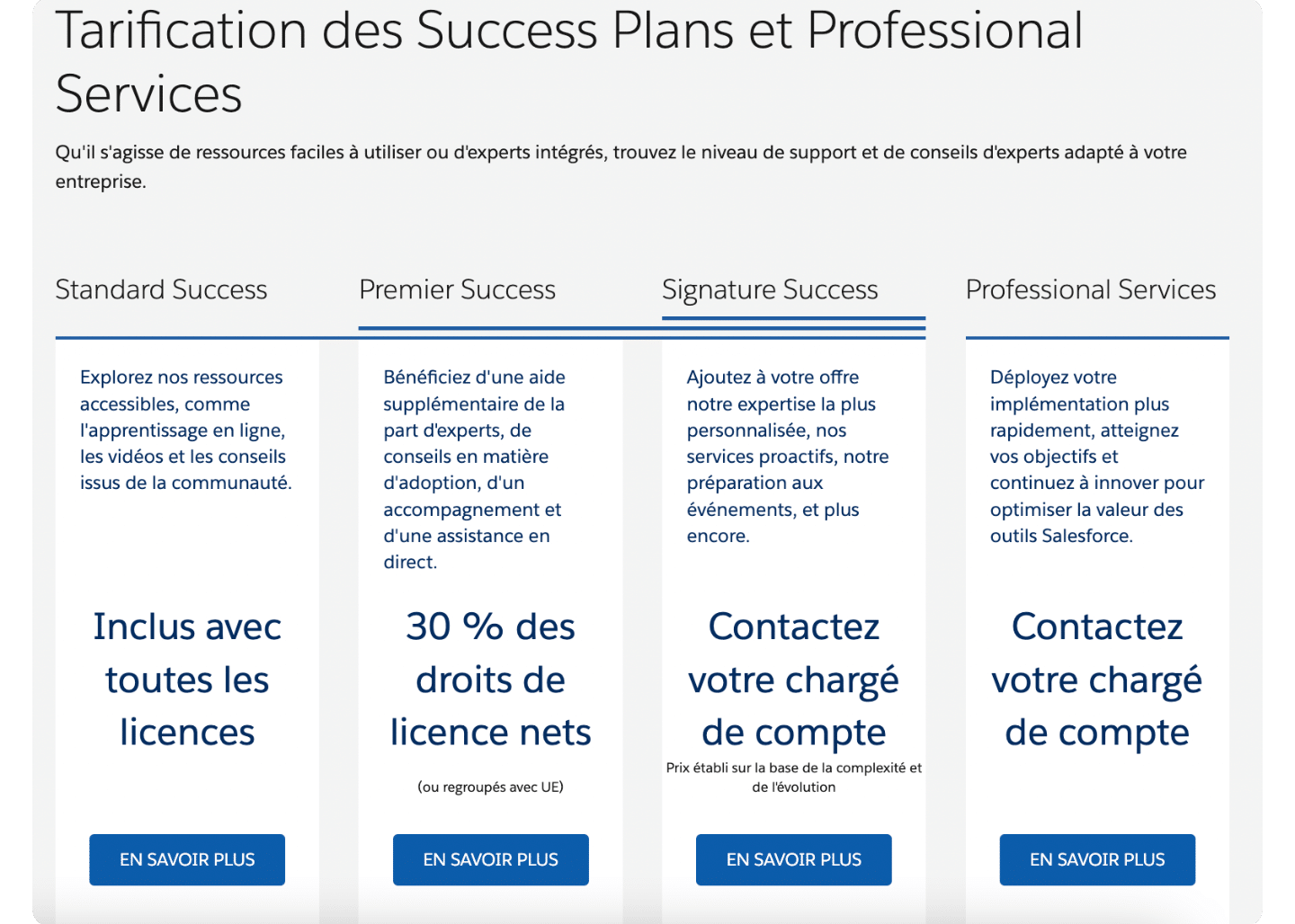
Salesforce Marketing Cloud customer feedback
On G2, 4,233 customers gave Salesforce Marketing Cloud an average score of 4 out of 5. On Capterra, the average rating is 4.2 out of 5, the average of 485 published. The average score is therefore very respectable. 1351 customers have left a review on Trusradius, with an average rating of 7.8 out of 10.
Salesforce Marketing Cloud users emphasize the platform’s rich functionality. Analysis tools and integration capabilities are also often cited.
The main criticisms relate to the complexity of the platform, which requires a fairly long learning curve. Another negative point is the price. Salesforce Marketing Cloud is clearly not for SMBs…unless you opt for Salesforce’s recent Starter package, priced at $25 per user per month. To find out more about this offer, read thefull article on Salesforce’s pricing.
Discover Salesforce Marketing Cloud
Access the official Salesforce Marketing Cloud demo and explore the key features of Salesforce’s all-in-one marketing platform.
Salesforce Marketing Cloud offers and prices
Salesforce Marketing Cloud comes in 3 products.
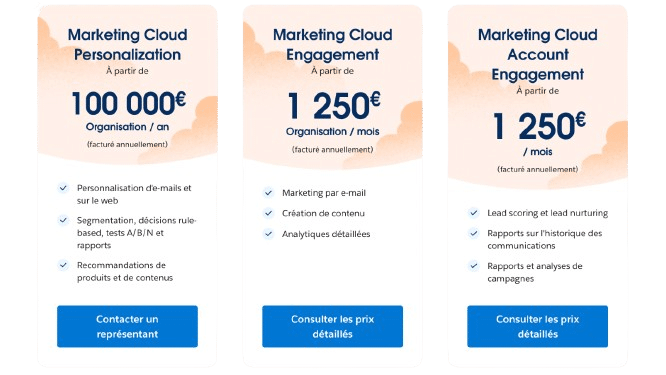
Here are some details on these 3 products and their associated prices:
- Marketing Cloud Engagement starts at $1,250 per month. At this price, you only have access to the email campaign manager and integration with Sales Cloud (the B2B CRM). For use of the Journey Builder (marketing automation), mobile campaigns (push and SMS) and access to Einstein (i.e., AI functionalities), you’ll pay $4,200 per month. Finally, Salesforce offers a tailor-made plan for complex, multi-entity and multinational organizations.
- Marketing Cloud Account Engagement also starts at $1,250 per month. At this price, you get access to lead generation and management functionalities (landing pages, forms, lead search tools) as well as an email campaign manager. To access marketing automation tools and advanced reporting, you’ll need to pay $2,750 per month. The plan giving access to AI functionalities is priced at $4,400 per month. Good to know: these three plans are limited to 10,000 contacts.
- Marketing Cloud Personalization, which goes far beyond what traditional marketing platforms can offer, starts at $100,000 per year. This plan makes it possible to personalize the customer experience in real time and across all channels, including the website and connected objects.
So, clearly, Salesforce Marketing Cloud isn’t for everyone. It’s one of the most expensive solutions on the market.
Something to keep in mind
Salesforce prices are indicative only. In practice, rates are often negotiated. So you won’t necessarily pay what the Salesforce site shows.
Salesforce Marketing Cloud can be enhanced with third-party Salesforce products, including :
- Data Cloud for Marketing, Salesforce’s CDP, unifies customer data from all corporate data sources, enabling ultra-targeted, 100% data-driven marketing. Data Cloud for Marketing is available from $108,000 per year.
- Marketing Cloud Intelligence, a sophisticated business intelligence reporting tool for analyzing customer behavior and the performance of campaigns and scenarios. Marketing Cloud Intelligence goes further than the dashboards and reports natively included in Marketing Cloud. The product starts at $3,000 per month.
- Loyalty Management, for managing loyalty programs, starts at $20,000 per month.
Whatever product and plan you choose, customer support is not included. Of course, you have free access to comprehensive online resources and training (the Trailhead), but if you want human assistance, you need to subscribe to the Premier Success Plan or the Signature Success Plan. The Premier Success Plan is billed at 30% of the net license fee. The Signature Success Plan is custom-billed.
Discover Salesforce Marketing Cloud
Access the official Salesforce Marketing Cloud demo and explore the key features of Salesforce’s all-in-one marketing platform.

